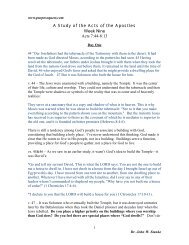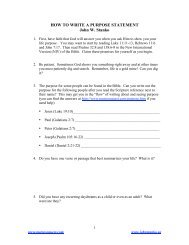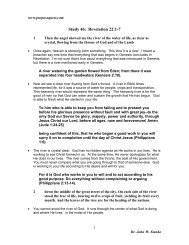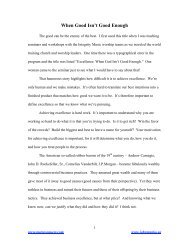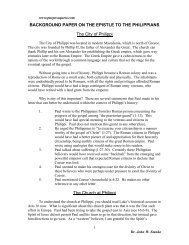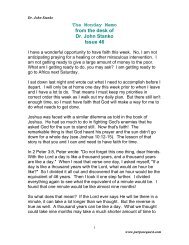Leadership Lessons from Egypt - Dr. John Stanko
Leadership Lessons from Egypt - Dr. John Stanko
Leadership Lessons from Egypt - Dr. John Stanko
Create successful ePaper yourself
Turn your PDF publications into a flip-book with our unique Google optimized e-Paper software.
<strong>Leadership</strong> <strong>Lessons</strong> <strong>from</strong> <strong>Egypt</strong><br />
By <strong>John</strong> <strong>Stanko</strong><br />
I love to study leadership models in the Bible and I’m sure you do, too. It’s a<br />
great way to garner valuable lessons <strong>from</strong> the case studies of people whom God used for<br />
His purposes. With that in mind, I want to present some lessons <strong>from</strong> a leader seldom<br />
studied: Pharaoh, the leader of <strong>Egypt</strong>.<br />
When I mention Pharaoh, who comes to mind? It’s probably the Pharaoh with<br />
whom Moses encountered in the book of Exodus. That Pharaoh, however, isn’t the one I<br />
want to focus on. There was more than one Pharaoh and, in this article, I want to look at<br />
the one who was Joseph’s contemporary in Genesis 37-50. This Pharaoh was one of the<br />
best leaders in the Bible and has something to teach us! Here’s why.<br />
EGYPT IN JOSEPH’S TIMES<br />
<strong>Egypt</strong> in Joseph’s times was the most powerful nation in the world. Pharaoh had<br />
oversight over a large population and army. When Joseph first arrived, <strong>Egypt</strong> prospered<br />
and there was no end in sight.<br />
Yet, God was doing something that would shape history for centuries to come.<br />
He wanted to move His people, Abraham’s family, to <strong>Egypt</strong> <strong>from</strong> where they would<br />
make their exodus back to the Promised Land centuries later. To accomplish that<br />
purpose, God sent Joseph ahead of his family to <strong>Egypt</strong> on a mission.<br />
While <strong>Egypt</strong> enjoyed their prosperity, Joseph was imprisoned – and then the<br />
drama played out that led to Pharaoh’s famous doubleheader dreams. If you remember,<br />
Pharaoh had two dreams, one where seven gaunt cows devoured seven fat cows, the other<br />
where seven lean heads of grain consumed seven healthy heads. Joseph helped Pharaoh<br />
www.purposequest.com www.johnstanko.us
understand that these dreams indicated seven years of famine would follow seven years<br />
of plenty.<br />
The period leading up to the dream, the dream interpretation and the dream<br />
application all give us valuable lessons <strong>from</strong> Pharaoh’s leadership that we would do well<br />
to emulate.<br />
PHARAOH’S LEADERSHIP LESSONS<br />
Take the time to read Genesis 40:1-5, 20-23; 41:1-4, 33-57; 47:1-4. What can we<br />
learn about Pharaoh <strong>from</strong> these passages?<br />
1. Pharaoh wasn’t afraid to lead his people. When Pharaoh had his dreams,<br />
there were no problems in <strong>Egypt</strong>. There was plenty of food and he learned<br />
<strong>from</strong> Joseph and his dream that there would be seven more years of plenty.<br />
The famine wasn’t even close to starting, but Pharaoh made firm decisions<br />
concerning the future. He began to prepare for the famine seven years in<br />
advance of its coming. What’s your seven-year plan for your organization?<br />
Do you even have one?<br />
2. Pharaoh made quick decisions when he found the right person. There was<br />
no procrastination when Pharaoh decided to act. Too often, leaders hesitate to<br />
gather more information. But Pharaoh knew he had found a “star” in Joseph<br />
and he acted quickly to secure his services and wisdom. Good people are<br />
hard to find. When you find them, hire them! You will still have to manage<br />
them or else you will eventually have a mess on your hands. Delegation<br />
doesn’t mean abdication of responsibility. It means you hold your team<br />
accountable for results, but don’t micromanage the process.<br />
3. Pharaoh understood personnel issues and effectively used probation,<br />
restoration and release. In Genesis 40, Pharaoh was angry with his<br />
cupbearer and his baker. Rather than “fire” them immediately, however, he<br />
took time to reflect on the situation. Too often, leaders can let personality<br />
2
conflicts or misunderstandings affect the relationships with the management<br />
team. Pharaoh could make quick decisions when needed, and I am sure he<br />
had a temper. In the case of these two “employees,” however, he waited one<br />
year. In some sense, he put them on probation.<br />
After a period of time, he “released” (all right, he executed) the baker and<br />
restored the cupbearer. Don’t let your personal preferences regarding<br />
personnel issues rob your organization of its best talent. Learn to establish a<br />
“cooling off” period before making final decisions. Let the employees or team<br />
members know that they are on probation. Then when you’ve made your<br />
final decision about the future, don’t linger any longer. Make it known to<br />
everyone.<br />
It is significant that, using this process, Pharaoh made the best choice, for<br />
the restored cupbearer was the one who introduced Pharaoh to Joseph, the<br />
man with the plan.<br />
4. Pharaoh spent time with his team. Pharaoh restored the cupbearer at his<br />
own birthday party that he held for his officials. The king of <strong>Egypt</strong> spent<br />
social time with his leadership team! It appears that they also talked some<br />
business while they met. It seems that Pharaoh never had his officials too far<br />
away <strong>from</strong> him at any point in time, so he could get their feedback and input.<br />
How close are you to your “team”? You don’t have to be their friend, but you<br />
do need to be their partner and associate.<br />
5. Pharaoh partnered with his opposite. Pharaoh didn’t fill his staff with<br />
people like him. He brought in some “opposites.” Pharaoh was obviously a<br />
visionary; he therefore hired a good operations man in Joseph to carry out the<br />
day-to-day plans of the kingdom. Partnering with your opposite can be<br />
difficult, for they see reality and life in contrast to your viewpoint. They can,<br />
however, see what you can’t (and vice versa), however, thus strengthening the<br />
team through diversity and friendly dissent.<br />
3
Over the years, I have worked at not just tolerating people who aren’t like<br />
me, but celebrating them! I need people who don’t think or look like me to<br />
build an effective team (that means women and persons of color). How<br />
diverse is your team? If your family member fits this need and has the skills,<br />
then employ them. If they don’t, spare your organization the pain of a bad<br />
hire by not employing them.<br />
6. Pharaoh recognized talent, gifting and “special ability.” In Genesis 47,<br />
Joseph brought five of his brothers to meet Pharaoh. When Pharaoh asked<br />
them what they did, they responded that they were shepherds. Pharaoh then<br />
made a revealing statement: “If any of them have special ability, put them<br />
over my own flocks” (Genesis 47:6). He didn’t give Joseph’s brothers a job<br />
because they needed one or because they were Joseph’s brothers. He only<br />
wanted those with “special ability” to serve on his leadership team.<br />
Pharaoh knew that world-class results come <strong>from</strong> employing world-class<br />
leaders and managers. Pharaoh had the good sense to hire Joseph but he also<br />
restored the right man in his cupbearer, for he was the one who eventually led<br />
Pharaoh to Joseph.<br />
Hopefully someone on your team can recognize talent. It doesn’t have to<br />
be the lead person. When you find someone with that ability, listen to that<br />
person. They will save you much aggravation and the pain of a bad hire. And<br />
don’t ever hire anyone only because they need a job or are related to you or<br />
someone already on staff.<br />
7. Pharaoh promoted youth. Joseph was only 30 years old when he entered<br />
Pharaoh’s court. Don’t be prejudiced against youth. If you find someone<br />
who is talented, hire that person, regardless of their age. Youth can lack<br />
experience, but they do have energy and they don’t know enough to prevent<br />
them <strong>from</strong> doing saying what everyone has said is impossible.<br />
4
8. Pharaoh hired someone with a shady past and no previous experience. Up<br />
to this point, Joseph only had leadership experience in Potiphar’s house and<br />
the prison. He also had an accusation of sexual harassment hanging over him<br />
<strong>from</strong> Potiphar. Pharaoh looked past that, however, to the needs that only<br />
Joseph could address. Almost anyone with talent will have some negatives;<br />
you can’t find perfect hires. So stop trying and instead find and work with the<br />
best talent you can discover.<br />
9. Pharaoh gave authority and established boundaries. Pharaoh put Joseph in<br />
charge of everything except “the throne.” He put Joseph in charge of<br />
operations to store food for the famine and then to distribute food in the<br />
famine. Joseph’s job description and expectations were clear; there was no<br />
ambiguity. While Joseph’s hiring was a quick one, his job description was<br />
clear and well thought out.<br />
10. Pharaoh was secure in his leadership and had Joseph with him “in the<br />
chariot.” Pharaoh had Joseph ride in the chariot as “second-in-command.” I<br />
have a picture in my mind that Pharaoh was in the same chariot or at least<br />
close by. When people honored Joseph, Pharaoh was secure enough that he<br />
wasn’t threatened by Joseph’s wisdom, power or position. Pharaoh was<br />
secure in his own leadership. He was taking a chance by putting this<br />
newcomer in charge, but Pharaoh shared his power and prestige with this man<br />
recently released <strong>from</strong> prison.<br />
11. Pharaoh used his power to empower the right people. All leaders have<br />
power. What distinguishes a good <strong>from</strong> a great or bad leader is how that<br />
power is used. Pharaoh used his power to empower Joseph to do the job that<br />
God had gifted him to do. Peter <strong>Dr</strong>ucker, father of modern management<br />
studies, stated that the job of management is to find out what management is<br />
are doing that prevents others <strong>from</strong> doing their job and then to stop doing it.<br />
Pharaoh used his power correctly; he used it to help his team get the job done.<br />
5
12. Pharaoh approved the plan and let Joseph carry it out. Pharaoh listened to<br />
Joseph’s strategy and then approved it. With his stamp of approval, he then<br />
let Joseph do it with a minimum of input or interference. Pharaoh did not<br />
micromanage or set up a bureaucracy that slowed things down.<br />
13. Pharaoh gave Joseph an unlimited travel budget. The Bible states that<br />
Joseph traveled throughout <strong>Egypt</strong>; he had freedom of movement to get his job<br />
done (see Genesis 41:46). If you want to empower your team, let them travel.<br />
Give them freedom of movement to go see and learn what they need to get the<br />
job done. I am not referring to first class travel to exotic places, but instead<br />
trips with purpose to benchmark and observe best practices wherever they<br />
may be found. This may be onsite visits or conferences that feature world-<br />
class teaching and instruction. If you want the best, let them go and learn<br />
<strong>from</strong> the best.<br />
14. Pharaoh was concerned for Joseph’s personal life. Pharaoh found a wife<br />
for Joseph and then helped him take care of Jacob and his brothers when they<br />
came to <strong>Egypt</strong>. Pharaoh made sure that Joseph shared in the wealth and<br />
blessing that was within Pharaoh’s power to bestow. Pharaoh made sure that<br />
Joseph had a life outside his work position and gave him land and money to<br />
go with it.<br />
15. Pharaoh stayed in touch with reality but let Joseph do his job. When the<br />
CONCLUSIONS<br />
famine arrived, the people cried out to Pharaoh – but Pharaoh sent them to<br />
Joseph and told them to do whatever Joseph told them to do. Wouldn’t all<br />
like to have a boss or supervisor like that!<br />
Pharaoh was rewarded well for his exceptional leadership skills. His country was<br />
saved <strong>from</strong> oblivion and suffering. He actually increased his power and position during<br />
the famine, because Joseph successfully leveraged their supply of food and seed for land<br />
and a future return on their investment. Pharaoh secured a place in history as a good<br />
6
leader, in contrast to his counterpart who wielded heavy-handed, authoritarian control<br />
during the time of Moses. Moses’ Pharaoh was such a bad leader that he allowed his<br />
personal pride and blindness to ruin his country for many centuries to come.<br />
What kind of leader do you want to be? I hope you want to be one like Joseph’s<br />
Pharaoh. Take some time to reflect on your style as it relates to Pharaoh’s and see where<br />
you need to improve. Then set about building a more effective team than you have now<br />
so that you and your organization can be the fullest, best expression of who it is that God<br />
intended for you to be.<br />
<strong>Dr</strong>. <strong>John</strong> <strong>Stanko</strong> is president of PurposeQuest International, through which he has taught<br />
biblically-based business and leadership principles in dozens of nations <strong>from</strong> Afghanistan<br />
to Zimbabwe. You may reach <strong>John</strong> through his blog at www.johnstanko.us.<br />
Unless otherwise noted, all Scripture references are <strong>from</strong> the New International Version.<br />
7



